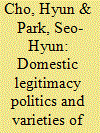| Srl | Item |
| 1 |
ID:
135294


|
|
|
|
|
| Summary/Abstract |
What drives East Asian regionalism? The rise of China and the perceived decline in the influence of the United States have sparked debates about the future of the regional order, including the yet-unresolved question of whose leadership is likely to be more stable and accepted as legitimate by other regional actors. What is puzzling, however, is that persistent demands for the formation of a coherent and uniquely East Asian regional institution have come not from China or the US, as is the focus of existing studies, but rather Japan and South Korea. In this article, we propose an alternative framework that conceptualises the varieties of East Asian regionalism, emphasising the multiple pivots and variegated levels of politics involved in efforts toward regional cooperation. We find that competing proposals for East Asian regionalism since the 1990s are not determined by structural pressures or the convergence of interests but rather result from domestic legitimacy politics. Japanese and Korean leaders have, at different time periods, proposed their own alternative region-making initiatives appealing to domestically contested views on how best to seek autonomy from the region's Great Powers as a way to enhance their political standing domestically and regionally.
|
|
|
|
|
|
|
|
|
|
|
|
|
|
|
|
| 2 |
ID:
186102


|
|
|
|
|
| Summary/Abstract |
After the Fukushima nuclear meltdown, the Angela Merkel government in Germany officially announced its decision to permanently shut down all of its seventeen nuclear reactors. In closer proximity to Fukushima, the Lee Myung-bak government in South Korea expanded its nuclear energy program with specific plans to construct more nuclear reactors in various locations and pursued more export opportunities. It was only in 2017 that the South Korean government, under President Moon Jae-in, announced a gradual phase-out of nuclear power plants in South Korea. What explains the contrasting paths of the German and South Korean nuclear energy programs in the immediate aftermath of the Fukushima nuclear disaster? Why did the same external shock prompt sudden policy reversal in Germany while it took six more years for South Korea to turn its course? While existing studies are helpful in accounting for the rise of particular energy policies, they are insufficient for explaining the causes and specific timing of major policy reversals in the face of external crises. Building upon the literature on political opportunity structures, this article argues that the emergence of new political opportunities and the shift in political framing with respect to nuclear energy caused nuclear phase-out in both countries. A closer look at the two national cases offers an opportunity to delineate the domestic political process of nuclear energy policymaking and evaluate the role of exogenous shocks, such as a major nuclear disaster, in shifting political opportunity structure and reshaping the perceptions of energy security and political risks.
|
|
|
|
|
|
|
|
|
|
|
|
|
|
|
|